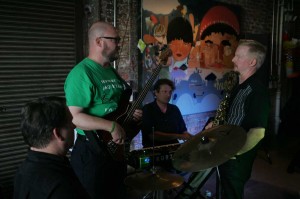It definitely wasn’t Bass Hall.
As cool and rocking and rolling as Shipping & Receiving is, it’s not where you’d expect to hear music of the kind regularly produced by the Fort Worth Symphony Orchestra.
Well, now irregularly produced by them.
Last Sunday at the Near Southside venue, several dozen symphony musicians, dressed in casual clothing and green t-shirts emblazoned with “Growth, Not Cuts,” gathered to perform a David Bowie-themed concert. It was supposed to take place at Bass Hall, but that was before Fort Worth’s cultural landscape drastically changed. About three weeks ago, FWSO orchestra members, through their union, the DFW Professional Musicians Association, rejected the last contract offered by the nonprofit’s management.
We’re “trying to have a good time while keeping the music going,” said FWSO bassist and spokesperson Paul Unger. “Our mission is to bring high-quality music to everyone in this community, and that’s what we’re going to continue to do.”
Gray overcast skies and the omnipresent threat of rain didn’t deter hundreds of patrons from showing their support for the musicians last Sunday. The three-hour concert featured a woodwind, brass, and string quartet. In addition to Bowie favorites, the players performed selected works from the classical music canon, including a crowd-pleasing rendition of a Haydn composition. The stage then opened to various karaoke acts and concluded with a set by the progressive jazz trio Flipside, cofounded by Unger.

In 2010, FWSO musicians took a 13.5 percent pay cut to shore up a $819,000 loss in revenue resulting from a nationwide recession. Contract negotiations for a new five-year contract between FWSO management and musicians began 15 months ago. Again citing revenue losses ($700,000 due to a loss of performances for the Fort Worth Opera, a drop in corporate giving, and a decrease in support from the Arts Council of Fort Worth, among other factors), FWSO president and CEO Amy Adkins, with the approval of the nonprofit’s board of directors, proposed cutting the concert season from 46 weeks to 43, decreasing artist fees for the Concerts in the Garden series by 25 percent, and eliminating three weeks of paid time off. The loss in wages would mean a nearly 23 percent loss in salary since 2010 after accounting for inflation.
More recently, the contract discussions went into federal mediations with a non-binding agreement on August 31. According to a statement released by Adkins and FWSO executive chairman Mark Nurdin, musician salaries (for non-principal positions) would drop from $54,953 to $51,370 between the 2015-2016 and 2016-2017 seasons before increasing to $56,859 by the 2019-2020 season. The current management agreement includes 42 days of paid maternity and paternity leave.
FWSO musicians were sold a bill of goods in 2010, Unger said.
“We were told that our sacrifice would right the ship,” he said, referring to the nonprofit’s long-term financial standing. The current proposal by the orchestra’s management would leave all 200 or so Fort Worth symphony members earning “$20,000 less than the national average,” Unger said.
For now, the stalemate leaves dozens of professional musicians looking for work elsewhere.
FWSO veteran cellist Karen Hall is making the best of the current situation, pouring her time and efforts into her nonprofit chamber music group Hall Ensemble.
When the orchestra went on strike, she knew she and her bandmates still had “opportunities to work together and perform great music,” she said. Her ensemble, a violin/bassoon/viola/cello quartet, consists of FWSO musicians and regularly features guest artists from the orchestra.
During the Hall Ensemble’s first concert, on September 22, Hall and her compatriots were touched by an outpouring of “community support” over the ongoing contract negotiations, she said.
Thanks largely to private donors, Hall and her ensemble could afford an extra educational outreach program after the strike began.
“We welcome opportunities to make sure that our area school children are enriched by classical music,” she said. Music education “has been shown to enhance education substantially.”
Unger said his colleagues are finding supplemental income through a variety of means.
“Some musicians have savings,” he said. Others, he continued, are getting by via “teaching, picking up freelance work, and subbing with other symphonies.”
The musicians of the FWSO, sans management, will perform Carmen and Danse à Grande Vitesse with Texas Ballet Theater in Bass Hall Fri-Sun Oct. 7-9. Unger and his colleagues also plan to perform at ArtsGoggle on Saturday, Oct. 8. On Thu., Oct. 13, the musicians are performing works by Strauss and Dvorák at Orchestra Hall in South Fort Worth. A “Day of Music” is planned to take place at several Fort Worth venues on Saturday, Oct. 22, and will feature various chamber groups consisting of FWSO performers.
“Over the past 10 years, we lost musicians at twice the rate we did the previous decade,” Unger said. “We’re willing to work with management, but any plan that doesn’t include growth will ensure [high-quality] musicians no longer come to Fort Worth.”
No talks are currently scheduled between FWSO musicians and management, Unger said. According to the FWSO website, concerts by Fort Worth’s only professional orchestra are cancelled through November 6. l












